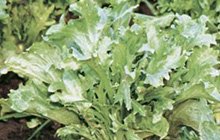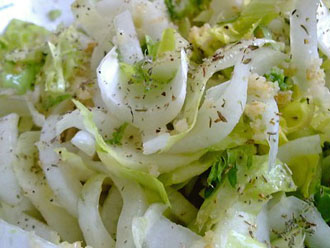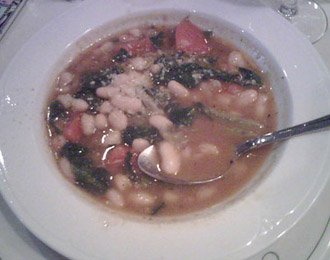Endive Nutrition facts
Endive, and its close relative escarole, are a green leafy vegetable with a hint of bitter flavor. Nevertheless, these popular salad plants meant much more than just leafy greens; packed with numerous health-benefiting plant nutrients such as anti-oxidant lactones, vitamin C, vitamin A, etc.
Botanically, this perennial herbaceous leafy plant belongs to the Asteraceae (daisy) family, in the genus, Cichorium, and is closely related to chicory, radicchio, and Belgian endive (witloof).
Scientific name: Cichorium endivia.

|
 |
| -Escarole, Flat leaf variety. Note for semi-blanched broad, spine-like dentate margin leaves. | Belgian endive-witloof. Note for creamy white, compact leaves. |
Endive is native to the Asia Minor region. This cool-season crop requires well-drained fertile soil to flourish. There exist two main cultivar varieties of endive: curly-endive (Frisée, Cichorium endivia, var crispum) with narrow curly leaves, and Escarole or scarole (Cichorium endivia, var latifolia) with broad leaves. Escarole leaves have serrated, dentate margins (like in dandelion or lettuce) with thick stalks. Its leaves feature, however, less pungency than the small, curly, intensely bitter taste of "frisée" (curly-endive).
Belgian endive or witloof is a popular winter season vegetable in Europe. It features smooth cream-colored leaves, compressed into a compact (bud-like) 10 to 12 cm long heads.
Health benefits of Endive
Endive is one of the very low-calorie leafy vegetables. 100 g fresh leaves carry just 17 calories; however, it contributes about 8% of the daily-required intake (DRI) of fiber.
Current research studies suggest that high inulin and fiber content in escarole help reduce glucose and LDL-cholesterol levels in diabetes and obese patients.
Endive and escarole carry numerous medicinally important compounds such as sesquiterpene lactones and plant sterols. Lactones such as lactucopicrin which give a bitter taste to endive have been found to have anti-tumor and anti-inflammatory properties.
Endive composes good amount Vitamin-A and ß-carotene. Both these compounds are known to have antioxidant properties. Carotenes convert into vitamin A inside the human body.
Furthermore, vitamin A is required for maintaining healthy mucosa and skin. Also, it is also an essential vitamin for good eyesight. Consumption of natural vegetables/greens rich in vitamin A helps to protect from lung and oral cavity cancers.
Further, it contains good amounts of many essential B-complex groups of vitamins such as folic acid, pantothenic acid (vitamin B5), pyridoxine (vitamin B6) and thiamin (vitamin B1), niacin (B3). These vitamins are essential in the sense that the human body requires them through external sources to replenish. They take part as cofactors in fat, protein, and carbohydrate metabolism.
Additionally, escarole is a good source of minerals like manganese, copper, iron, and potassium. Manganese is used as a co-factor for the antioxidant enzyme, superoxide dismutase. Potassium is an important intracellular electrolyte that helps counter the hypertension effects of sodium.
| Principle | Nutrient Value | Percent of RDA |
|---|---|---|
| Energy | 17 Kcal | <1% |
| Carbohydrates | 3.35 g | 2.5% |
| Protein | 1.25 g | 2% |
| Total Fat | 0.20 g | 1% |
| Cholesterol | 0 mg | 0% |
| Dietary Fiber | 3.10 g | 8% |
| Vitamins | ||
| Folates | 142 µg | 36% |
| Niacin | 0.400 mg | 2.5% |
| Pantothenic acid | 0.900 mg | 18% |
| Pyridoxine | 0.020 mg | 1.5% |
| Riboflavin | 0.075 mg | 6% |
| Thiamin | 0.080 mg | 7% |
| Vitamin A | 2167 IU | 72% |
| Vitamin C | 6.5 mg | 11% |
| Vitamin E | 0.44 mg | 3% |
| Vitamin K | 231 µg | 192% |
| Electrolytes | ||
| Sodium | 22 mg | 1.5% |
| Potassium | 314 mg | 7% |
| Minerals | ||
| Calcium | 52 mg | 5% |
| Copper | 0.099 mg | 11% |
| Iron | 0.83 mg | 10% |
| Magnesium | 15 mg | 4% |
| Manganese | 0.420 mg | 18% |
| Phosphorus | 28 mg | 4% |
| Selenium | 0.2 mcg | <1% |
| Zinc | 0.79 mg | 7% |
| Phyto-nutrients | ||
| Carotene-ß | 1300 µg | -- |
| Carotene-α | 0 µg | -- |
| Cryptoxanthin-ß | 0 µg | -- |
| Lutein-zeaxanthin | 0 µg | -- |
Selection and storage
Fresh Endive is available all around the year in the markets. Choose crispy, tender leafy tops. Avoid tough, discolored yellow leaves.
Store greens in a plastic bag in the refrigerator. It will stay fresh for 3-4 days.
Preparation and serving methods
 |
| Belgian endive, avocado-couscous salad. Photo courtesy: Lablascovegmenu. |
Wash fresh endive in cool running water. Discard yellow or any discolored leaves. Remove tough lower ends. Chop the leaves using a paring knife.
Curly endive is generally available in the stores as blanched pale "frisée." Blanching removes the bitterness off the leaves and enhances their flavor. Blanching is done by inhibiting sunlight. To achieve this, farmers cover endive crops with inverted bushel baskets or plastic plates for 2-4 weeks.
Wash them thoroughly in cold water before use. Trim the stem end with a sharp knife.
 |
| Escarole bean soup. Photo courtesy: Lisa Williams |
Here are some serving tips:
Frisée especially features in favorite French salad Lyonnaise.
Escarole is used in salads, soups (escarole bean soup), and sautéed recipes.
Witloof is used raw in salads or braised and served as a vegetable.
Safety profile
Endive is widely consumed all over Europe and in some American states. Although this green leafy vegetable contains high concentrations of bitter glycosides and inulin, no known side effects so far notified when used in moderate quantities.(Medical disclaimer).
≻≻-Read more on Chicory greens nutrition facts.
≻≻-Back to Vegetables from Endive. Visit here for an impressive list of vegetables with complete illustrations of their nutrition facts and health benefits.
≻≻-Back to Home page.
Further resources:
Home gardening series-University of Arkansas division of Agriculture-pdf.